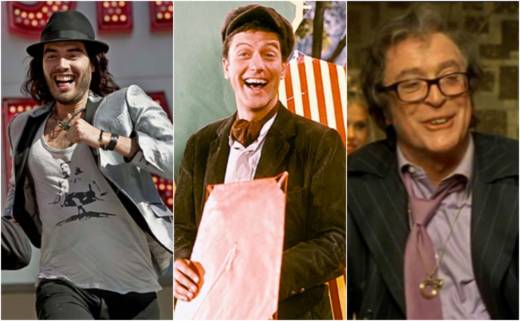First up, here's Michael Caine (a bonafide, real-life cockney) in Austin Powers: Goldmember doing some cockney basics with Mike Myers. All the audience is told is that this is "English-English:"
More realistically, there's this also-sub-titled scene from Guy Ritchie's excellent Lock, Stock and Two Smoking Barrels:
Russell Brand (another real-life cockney) squeezed in a reference to a "boat race" (which means "face") in this scene from Get Him to the Greek:
Which brings us to the part that confuses foreigners: What the hell are they talking about? Fear not. Cockney rhyming slang is not as complicated as it first sounds. Most historians agree that this particular form of the English language has its roots in the 1840s. It is widely presumed to have been invented by the working class residents of London's East End to outsmart fancy upper classes, as well as outsiders in general.
The principles of cockney rhyming slang are simple: instead of saying the word you want to convey, you say something that rhymes with it instead. If that sounds weird, take comfort in the fact that you've probably used, or understood, cockney at least once in your life. This is thanks to the fact that, somehow, the term "brass tacks" (cockney rhyming slang for "facts")made it to U.S. shores and stuck around.
It should be noted that there is a very limited set of permitted rhyming slang terms though; you can't just make it up as you go along. It must be agreed upon by the community at large. Even under these slightly restrictive conditions, new terms come into favor and stick pretty frequently. (For example, these days, if something's "a bit Brad Pitt"... well, let's just say, it's not very good...)
There are entire guides online to study, for those who want to learn this ever-evolving language in more depth. The area where cockney rhyming slang actually does become a bit difficult is only with the true experts. Because they use it daily, they've done away with the full rhyming terms, for the sake of brevity. Ergo:
Apples = Apples and Pears = Stairs.
The Dog = Dog and Bone = Phone.
Plates = Plates of Meat = Feet.
Barnet = Barnet Fair = Hair.
(Shoutout to Barnets Salon on San Francisco's 16th Street for using that last one!)
Here's Danny Dyer, actor in BBC soap opera Eastenders (and much beloved cockney) talking about how he worked to bring more authentic rhyming slang into the show:
Clear as mud, right? Well, that might be the accent itself. America has been listening to terrible fake versions for years, which has confused things to no end.
Take, for example, Sons of Anarchy alum Charlie Hunnam's version of cockney, for 2005 movie Green Street Hooligans. This proves definitively that being English does not automatically grant the ability to sound cockney. At all. This clip is guaranteed to reduce every British person on Earth to actual tears of laughter:
Of course, the most egregious and well known example of cockney-butchery is undoubtedly Dick Van Dyke's Bert in Mary Poppins. Bert's whole deal infuriates British people to this very day.
This is why:
For the sake of contrast, here's what actual cockneys sound like when they're singing old East London classics. These traditional songs—such as "Knees Up, Mother Brown," "My Old Man Said Follow the Van," and anything performed by Chas and Dave—have been traditionally sung around the "old Joanna" (rhyming slang for "piano") at rowdy gatherings in the pub, ever since cockneys became cockneys.
Which is why English punk band The Business did this cover:
The most common view of Britain presented in America is genteel, refined, and royal, so part of the appeal of cockneys for Americans has always been the sheer degree of mystery involved. There is, quite often, a menacing streak involved in portrayals of cockneys, thanks to the working class nature of the East End of London and its history with gangs—the best known figures of which are, to this day, the Kray twins, whom movies like 2015's Legend and 1990's The Krays eulogized.
And while the cockneys in Gary Oldman's gritty film about his childhood, Nil By Mouth, are shocking for overseas audiences, and Ray Winstone scares the crap out of almost everyone in almost everything he is ever in, characters like Alfie Solomons in Peaky Blinders carry a strange, sinister allure:


